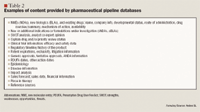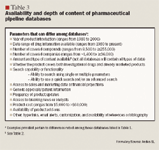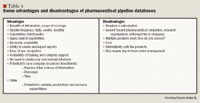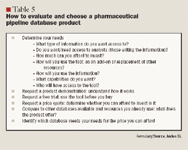- Safety & Recalls
- Regulatory Updates
- Drug Coverage
- COPD
- Cardiovascular
- Obstetrics-Gynecology & Women's Health
- Ophthalmology
- Clinical Pharmacology
- Pediatrics
- Urology
- Pharmacy
- Idiopathic Pulmonary Fibrosis
- Diabetes and Endocrinology
- Allergy, Immunology, and ENT
- Musculoskeletal/Rheumatology
- Respiratory
- Psychiatry and Behavioral Health
- Dermatology
- Oncology
Spotlight on pharmaceutical pipeline database products: A useful resource for PBMs and MCOs
To effectively gauge the potential clinical and economic impact of drug and biologic therapies that are pending FDA approval, the monitoring of pharmaceutical pipelines has become an essential function of pharmacy benefit management (PBM) companies and managed care organizations (MCOs); one source of pharmaceutical pipeline information is subscription-based pharmaceutical pipeline databases. Examples of some of these databases, along with the types of information provided and advantages and disadvantages of such products, are presented.

Key Points
Abstract
To effectively gauge the potential clinical and economic impact of drug and biologic therapies that are pending FDA approval, the monitoring of pharmaceutical pipelines has become an essential function of pharmacy benefit management (PBM) companies and managed care organizations (MCOs). Various methods and resources may be used by PBMs and MCOs to monitor the pharmaceutical pipeline. One such source of pharmaceutical pipeline information is subscription-based pharmaceutical pipeline databases. Several pharmaceutical pipeline database products are currently available. Examples of some of these databases, along with the types of information provided and advantages and disadvantages of such products, are presented. Information on how to evaluate and select a database is also provided. (Formulary. 2008;43:420–422.)
To effectively gauge the potential clinical and economic impact of drug and biologic therapies that are pending FDA approval, the monitoring of pharmaceutical pipelines has become an essential function of pharmacy benefit management (PBM) companies and managed care organizations (MCOs). Various methods and resources may be used by PBMs and MCOs to monitor the pharmaceutical pipeline, including reviewing healthcare or financial analysts' reports, obtaining information directly from pharmaceutical companies or government agencies, subscribing to numerous pharmaceutical-focused publications and/or drug information resources, using Internet search engines, and attending pharmaceutical-based conferences.




As mentioned earlier, many of these products have adapted their information and data sets to correlate with the data that PBMs and MCOs are seeking for pipeline monitoring. To further improve the marketability of these products, some of the companies that provide pipeline databases are working in conjunction with their PBM and MCO clients to continually enhance their products and customize them for the managed care market.

Dr Andes is the director of Drug Information Services, informedRx, an SXC company, Lisle, Illinois.
Disclosure Information: The author reports no financial disclosures as related to products discussed in this article.
Acknowledgment: The author acknowledges Sina S. Carlson, PharmD, manager, Clinical Communications, informedRx.
Editors' Note: This article is adapted from the roundtable presentation "An analysis of commercially available pharmaceutical pipeline databases: Determining their utility & value to PBMs and MCOs," which was originally presented at the 2007 Academy of Managed Care Pharmacy Educational Conference; Boston, MA: October 26, 2007.
Employers Face Barriers With Adopting Biosimilars
March 1st 2022Despite the promise of savings billions of dollars in the United States, adoption of biosimilars has been slow. A roundtable discussion among employers highlighted some of the barriers, including formulary design and drug pricing and rebates.
